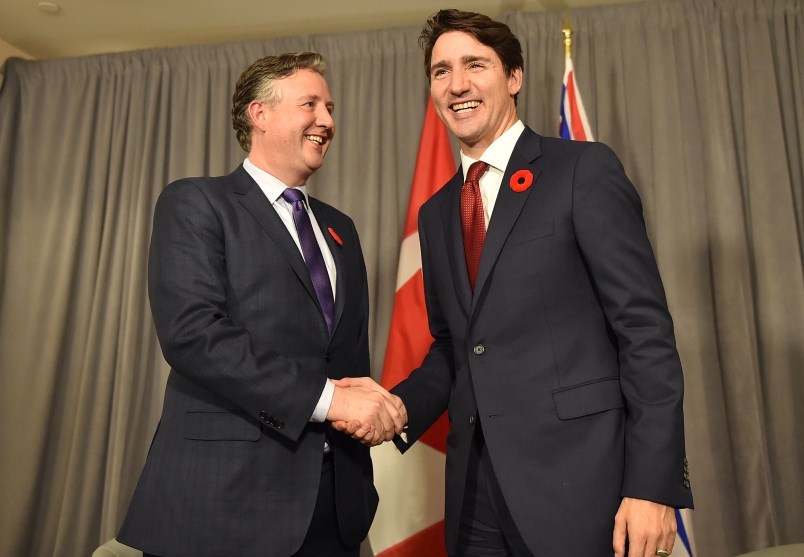The funding will come from the federal government’s $1 billion Rapid Housing Initiative, which was announced in September by Ahmed Hussen, the federal minister responsible for housing.
“I’m happy this morning,” said Mayor Kennedy Stewart, noting he had several calls with Hussen leading up to Tuesday’s announcement. “I think these phone calls are beginning to pay off.”
The funding now means Stewart and city staff have to choose which projects in the city meet the criteria set out in the program, which allows for the construction of modular housing, as well as the acquisition of land and the conversion of existing buildings to affordable housing.
Stewart wouldn’t specify projects for fear that property owners might drive up prices of buildings or land, if they knew the city was interested in buying their property for affordable housing.
The application process for the funding opened Tuesday, with approvals expected in weeks, said Stewart, adding that the city will team up with organizations and non-profits to apply for a separate pool of money — $500 million — from another federal fund, with the aim of acquiring funds mainly for Indigenous housing.
“The feds want this money out the door before the end of the year — all of it,” said Stewart, noting the urgency to identify projects in Vancouver, with staff focused on what can open or be built the fastest and “what gives us the biggest bang for the buck.”
How much are Canadian cities each receiving?
The $51.5 million is a considerable sum but pales into comparison to the $203.3 million Toronto will receive. Montreal will receive $56.8 million, Calgary $24.6 million and Surrey $16.4 million.
The Capital Regional District, which encompasses the southern tip of Â鶹´«Ã½Ó³»Island and the southern Gulf Islands, is the only other B.C. municipality or agency to receive money under the “major cities stream” of the program, with $13.1 million committed.
Coun. Jean Swanson said the $51.5 million is “definitely better than nothing,” suggesting it could pay for 150 modular housing units, or to lease a vacant lot or hotels rooms to get people off the street.
“We do still have probably 3,000 homeless people in Â鶹´«Ã½Ó³»who need permanent housing, so the feds are definitely not filling the need for permanent housing,” Swanson said in an email Tuesday.
“With twice that much, every year, and with the province matching, we could get a handle on homelessness in three or four years. So we need to keep up the pressure.”
Operating buildings not part of the deal
The federal funding doesn’t allow the money to be used to operate buildings, which Stewart said has to come from the provincial government, which has been in a holding pattern during the writ period during the election campaign.
“We need the province now to agree to operate these buildings, or provide the operating funding,” he said, noting he has had conversations with B.C. Housing, the government’s housing arm. “We can’t put people in hotel rooms without wraparound services [such as health care].”
The funding comes three weeks after Â鶹´«Ã½Ó³»city council directed staff to spend up to $30 million to assist in buying and leasing hotels and other buildings to serve as temporary — and possibly permanent — housing for people living on the streets.
The $30 million is expected to come from a $75 million city fund dedicated to acquire affordable housing. Council also ordered staff to use the 65-unit city-owned 2400 Motel on Kingsway and the Jericho Hostel at Jericho Beach to house homeless people.
Those buildings still haven’t opened.
A staff report before council identified 290 units in undisclosed buildings that could cost $125 million to $240 million to buy, with another $11 million required for operating costs, including providing tenants access to health care and other services.
The 290 units would accommodate less than half of the 750 homeless people the city estimates live on the streets, with about 200 residing in Strathcona Park’s tent city.
“This is a really, really good start"
Vancouver’s overall homeless population, when including people residing in some form of shelter, is more than 2,000 people, according to recent counts and estimates from city staff, although city councillors like Swanson suggest it’s higher.
Council also heard the purchase price for a commercial hotel could cost $400,000 to $500,000 per door. City staff indicated at the Oct. 8 council meeting that they were in “the full throes of discussion with multiple sites” in preliminary work to secure housing.
Stewart attributed the creation of the federal government’s Rapid Housing Initiative to his efforts and those of other mayors belonging to the Federation of Canadian Municipalities’ Big City Mayors’ Caucus in pressuring the Trudeau government to address affordable housing needs in Canada.
“This is a really, really good start,” he said, noting the federal government has been previously absent from the affordable housing discussion in Vancouver. “If we can show success, then it will encourage the federal government to do this again.”
In 2017, the federal government announced a $40-billion, 10-year housing strategy that aimed to reduce "chronic homelessness" by 50 per cent by 2027.
@Howellings



